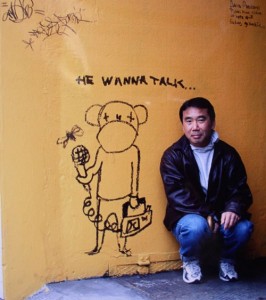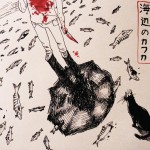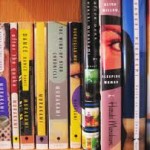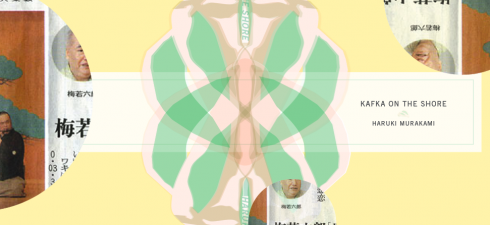 Over the last few months, I’ve embarked on a self-imposed Haruki Murakami reading challenge (or binge, sparked by finding so many copies of his novels in my usually sparse library). So far, I’ve read four of the Japanese writer’s novels, from one of his first novels to the more recent: South of the Border, West of the Sun, A Wild Sheep Chase, The Wind-Up Bird Chronicleand Kafka on theShore. Murakami tends to provoke strong reactions in his readers. In a review for The Guardian, novelist David Mitchell described Murakami’s impact:
Over the last few months, I’ve embarked on a self-imposed Haruki Murakami reading challenge (or binge, sparked by finding so many copies of his novels in my usually sparse library). So far, I’ve read four of the Japanese writer’s novels, from one of his first novels to the more recent: South of the Border, West of the Sun, A Wild Sheep Chase, The Wind-Up Bird Chronicleand Kafka on theShore. Murakami tends to provoke strong reactions in his readers. In a review for The Guardian, novelist David Mitchell described Murakami’s impact:
“When the English translation of [his] bestselling The Wind-Up Bird Chronicle transformed one of Japan’s best-kept literary secrets into the world’s best-known living Japanese novelist, this reviewer’s acquaintances neatly subdivided themselves into three groups: besotted devotees (one British friend went so far as to name his newborn son “Haruki”); critical admirers; and people who came out in a nasty rash.”
Four novels later, I find myself firmly in the critical admirers’ camp. Reading several works by the same author in fairly quick succession is always an interesting exercise. Most writers essentially tell the same story over and over or, at least, continue to explore the same themes and elements. Whether those similarities build and deepen or begin to wear thin depends largely on the talent of the writer and whether they are able to mine the same territory to make fresh discoveries. Indeed, lack of freshness is the biggest complaint of Murakami’s critics. Bold, over-the-top, inventive writing is the hallmark of his style and it is both a blessing and a curse. Encountering Murakami’s surrealistic world for the first time is thrilling, but it is inevitable that the thrill fades upon subsequent encounters.
Yet, Murakami is wildly inventive and ambitious, the worlds he creates are filled with talking animals (an egomaniacal sheep bent on world  domination in Wild Sheep Chase and cats in Kafka on the Shore), mysterious quests, the ennui of modern urban life, UFOs, graphic sex, mistaken identities, people with special powers, physical and psychological netherworlds, humor, forays into philosophy, music and the joys of reading and seductive, intelligent and elusive women. The surrealistic or metaphysical elements of his prose are grounded by realism and the steady reporting of comforting quotidian details (you will never wonder what Murakami’s characters are eating and drinking) interlaced with bits of poetry. For example, in Kafka on the Shore, one of Murakami’s characters — a transgendered woman — describes Aristophanes’ ideas about each person being divided and looking for their other half, followed by a detailed description of a private library where much of the novel’s action takes place and this description of the head librarian, Miss Saeki:
domination in Wild Sheep Chase and cats in Kafka on the Shore), mysterious quests, the ennui of modern urban life, UFOs, graphic sex, mistaken identities, people with special powers, physical and psychological netherworlds, humor, forays into philosophy, music and the joys of reading and seductive, intelligent and elusive women. The surrealistic or metaphysical elements of his prose are grounded by realism and the steady reporting of comforting quotidian details (you will never wonder what Murakami’s characters are eating and drinking) interlaced with bits of poetry. For example, in Kafka on the Shore, one of Murakami’s characters — a transgendered woman — describes Aristophanes’ ideas about each person being divided and looking for their other half, followed by a detailed description of a private library where much of the novel’s action takes place and this description of the head librarian, Miss Saeki:
“She’s a little on the tall side for someone of her generation. She’s wearing a blue half-sleeve dress and a cream-colored cardigan, and has excellent posture. Her long hair is loosely tied back, her face very refined and intelligent-looking, with beautiful eyes and a shadowy smile playing over her lips, a smile whose sense of completeness is indescribable. It reminds me of a small, sunny spot, the special patch of sunlight you find only in some remote, secluded place.”
For me, Murakami’s storytelling is so enjoyable that it is easy to overlook his flaws — the lack of freshness, sometimes shadowy underdeveloped characters and loose ends that rarely find themselves completely tied up in the end. His novels are suffused with loss and longing, the build-up is always more satisfying than the resolution, for both the characters and the reader, but it doesn’t take away their impact.
 A few words about the books themselves. The Wind-Up Bird Chronicle is the most serious and literary in its ambitions. I thought it had moments of absolute brilliance, but I actually preferred the less well-reviewed Kafka on the Shore, which I would highly recommend as an introduction to Murakami and his style. A Wild Sheep Chase is one of his earlier novels; it’s enjoyable, but half-baked. South of the Border holds a special place for me. It is a quieter, smaller novel — a mood piece about longing, impossible love and middle-aged angst. Not as surreal or exuberant as the others, but hauntingly beautiful. His most recent, IQ84, was published in Japan in 2009 and will be released later this year in America and the United Kingdom. I’ll definitely be reading.
A few words about the books themselves. The Wind-Up Bird Chronicle is the most serious and literary in its ambitions. I thought it had moments of absolute brilliance, but I actually preferred the less well-reviewed Kafka on the Shore, which I would highly recommend as an introduction to Murakami and his style. A Wild Sheep Chase is one of his earlier novels; it’s enjoyable, but half-baked. South of the Border holds a special place for me. It is a quieter, smaller novel — a mood piece about longing, impossible love and middle-aged angst. Not as surreal or exuberant as the others, but hauntingly beautiful. His most recent, IQ84, was published in Japan in 2009 and will be released later this year in America and the United Kingdom. I’ll definitely be reading.
;

I am in the unabashed admirers of Murakami camp. I like your review and I do agree with some of the flaws you pointed out in his books, especially his earlier ones. I am just really glad to find someone else who likes South of the Border, West of the Sun. It is my favorite Murakami novel. I also recommend Hard-Boiled Wonderland and the End of the World. It is the most fantastical, SF, crime-noir-ish of his books and is just cool.
Topher, Hard-Boiled is the next one on my list. South of the Border, West of the Sun was the first Murakami I read. Such a beautiful novel, it has really stayed with me.
Cool. Been on my “to do” list. So you’d recommend I read Kafka first?
Yesterday, I would have said read Kafka, but Nate’s post is making me think about how great Wind-Up Bird is. I don’t think you would go wrong with either one. Kafka is lighter and very funny in places, Wind-Up Bird has a weightiness that may stick with you longer.
Also, one thing I didn’t mention much in my post is that Murakami is a huge music fan. Like the protagonist of South of the Border, he owned a jazz club before he became a novelist and each book I’ve read is full of great asides and tangents about the transformative power of music and reading. Great for book and music nerds.
I loved The Wind Up Bird. At time I felt like it was almost magical, as if I were being transported to this crazy world that really exits. My dreams even changed while reading that book and for a while afterwards. I chose it for our book club group and it was a book that about 1/2 the group really didn’t like at all while the rest of us were either firm or begruding admirers. I happened to order Norweigan Wood today, I’m looking forward to exploring some of his other novels.
bandanamom, Murakami got into my dreams as well. I rarely remember my dreams, but I was having vivid, memorable dreams for almost the whole week of reading Kafka.
I’ve read most of Murakami’s books, and Wind Up Bird is one of my favorite of any book I’ve ever read. I’m giving it a second reading right now. Somehow, it resonated with a lot of my own spiritual beliefs. In the book, goes down and sits in a bottom of a dry well for three days, contemplating the experience of his own crumbling marriage, and the tortures of World War II.
I find the metaphor of sitting at the bottom of a dry well to be very powerful. To me, that is a perfect metaphor for depression. Depression to me feels exactly like a deep, empty well, that seems to go down and down forever. The most horrible thing about it is the emptiness, the void. It wants desperately to be filled with something. To me, that is what addiction, abuse and sin are often about. Trying desperately to fill the void inside a barren well. To me, the well is the same well that Jesus said should be flowing up with water into everlasting life. There is no more perfect way to describe depression than having that same well be completely dry, empty, and dark.
Yet within sitting within that dry well, Toru developed a healing mark. This is also very powerful to me. It means that through the experience of something terrible one can sometimes become a healer, or gain special gifts. I’ve always thought that marks are very powerful metaphors. I have a good friend with burns all over his body from a Russian hospital accident. Yet he credits these marks with giving him the power and the will to get out of Russia and start a new life for himself and his family. I have another friend who is a principle dancer with the Houston Ballet. He has a giant birthmark covering half of his face in a very bizarre manner. Yet he is one of the greatest male dancers I have ever seen. His acting and ease as a dancer is nothing short of miraculous. I have to say, I think that something about his mark gave him special powers, if only because it set him apart and made him feel somehow called to something greater than others.
And even when the mark is not visible, those who have experienced great afflictions are often more gifted healers than those who haven’t. They seem to be able to empathize much better, and this makes them able to open up to others and help them deal with their problems. In the end, only through sitting repeatedly in the bottom of that well, and battling his inner demons was Toru able to heal the well and bring water back into it, and symbolically, to heal himself and his family. This also rings so true to me. It seems that sometimes healing only comes after spending a long time in the bottom of the well and facing the darkness. This man wasn’t forced to go into the well. He chose to go down there so that he could meditate. Sometimes, I think that we also need to face the darkness. As Joseph Smith said, we need to “reach into and contemplate the darkest abyss.”
The other theme that resonated deeply with me was about families, and how abuses and darkness are passed down from generation to generation. In this story, Toru was not confronting his own family history, but his wife’s family’s dark past, and their contribution to the atrocities in WWII. I found this to be very powerful. When we get married, we inherit our spouses’ family in a very real way. In the story, even when Toru was separated from his wife, her demons were his demons. To heal her was to heal himself. In the end, it was a love story about a man who continued to be completely bound to his wife in spirit and mind, searching out and trying to reach her, to understand her, even after she had completely deserted him and betrayed him.
Sorry to leave such a long post. I just loved the book so much, I had to share my thoughts with others of faith who also have read it.
Nate, your interpretation of the well is very poignant, the part about the water of everlasting life resonates really resonates with me. I think the water is that wellspring of compassion, or Christ like love, that flows through and unites all of us.
I have been meditating a lot over the last year or two and so I thought a lot about those experiences while I was reading those portions of the novel. For me, the sense deprivation at the bottom of the well mirrors the still place you are trying to get to in meditation. When you first start sitting, you learn to focus on the breath and then you gradually move to being mindful of the body and the thoughts and feelings that arise as you sit (much as Toru does as he sits with his breath and the bat). As your body experiences discomfort or your mind careens around wildly, you learn to sit with those things and give them attention, to observe your experience rather than being bound up in it. I have found that this has helped me tremendously as I work towards getting to the place you describe so well:
When we are able to stay with our darkest experiences and emotions instead of running away from them, I think we are able to use them as tools, tools to understand ourselves and others with more kindness and compassion.
And, no apologies for long responses. Thank you for sharing your thoughts!
I will return and report! Just ordered ‘Wind-Up Bird Chronicle’, ‘Hard-Boiled Wonderland…’ and ‘South of the Border…’. They’ll be with me tomorrow… so I should concentrate on finishing the books I’m reading today so I can get started on Murakami!
I loved your review, Heidi. I’m very interested in how the surreal rises up from realism. I’ll have to see for myself when I read the novels, but your observation of occasional banality and loose ends is reminiscent of, for me, real life! So I’m hoping that reading his fiction will help me both in being comfortable with that inevitability, while looking for those surreal moments that rise up from the ‘cracks’ of the ‘real’.
Andy, hope you enjoy!
Absolutely. Interestingly, I find that the occasional banality or loose ends are comforting rather than boring or frustrating. The realism is grounding and seems to prepare the mind to go with Murakami when he introduces a man who can talk to cats or a mark that healing powers. More than that, I think the mix of surrealism and realism is more like felt reality. Much of life is caught up in banal day to day living, but there is also so much that is surreal, ephemeral, unexplainable.
I first picked up Murakami a few years back because I was looking to read some Japanese literature. I immediately worked through his entire backlist because I found his work to be so compelling. But here is the odd thing; when asked what it is I like about his work I can think of no reason. I just love it. He is the only author that strikes me this way. It is a little disconcerting, but then so is his writing.
I just found this post and I have to comment even though probably no one will see it. I discovered Murakami last year and he’s pretty much completely charmed me–even when I read the ones that aren’t quite as engrossing (Sputnik Sweetheart, Blind Willow Sleeping Woman), it doesn’t diminish my love for his books, or my excitement to read more of them. After Dark was my first and Norwegian Wood my second–I absolutely adore them both, but NW is my favorite. I have The Elephant Vanishes, Wind-Up Bird, and Hard-Boiled Wonderland on my bookshelf at home, and I’ve been looking for Kafka on the Shore at my local bookstores. There’s something so beautiful about his writing to me, and his characters (especially the ones in After Dark and Norwegian Wood) are people I wish I knew; their pain is so frank and accessible and somehow makes them lovely. I actually haven’t picked up one of his books in a while, but after having come across this post I’m anxious to go home and start them again immediately.
Miri, so cool to find another devotee! I’m still reading. I’ve just finished Norweigan Wood and I’ve got 1Q84, in all it’s two-volume, 1,000 page glory, sitting on my bedside table. I don’t think I’ve ever read through an author’s entire catalogue in such quick succession. The novels and Murakami’s style just really, really resonates.